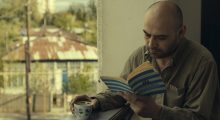Authors — Giovanni Marchini Camia
-
“Now the Main Person Talking about Lilly is Joe Rogan”: Michael Almereyda and Courtney Stephens on John Lilly and the Earth Coincidence Control Office

John Lilly’s very Californian trajectory from Cold War scientist to New Age visionary, aided by prodigious consumption of LSD and ketamine, feels quaint from today’s vantage. The Silicon Valley inventors and tech pioneers who could be considered his present-day counterparts mostly went the opposite route—first taking psychedelics and proclaiming lofty ideals, then turning to ever more terrifyingly real fantasies of world domination. Such comparisons account for the wistful experience of watching John Lilly and the Earth Coincidence Control Office, Michael Almereyda and Courtney Stephens’s documentary portrait of Lilly, which premiered at this year’s International Film Festival Rotterdam. That’s not to say […]
by Giovanni Marchini Camia on Feb 25, 2025 -
Popular and Political Argentinian Cinema at Viennale 2023

The particular focus of this year’s Viennale might have been Chile—the main retrospective, dedicated to Raúl Ruiz, was paired with a program exploring the country’s cinema in the half century since the 1973 coup—but its neighbor Argentina was also very well-represented. More than a specific curatorial inclination, this reflected the fact that it’s been a terrific year for Argentine film. Alongside such festival-circuit hits as Lisandro Alonso’s Eureka, Eduardo Williams’s The Human Surge 3 and Rodrigo Moreno’s The Delinquents, the Viennale screened more modestly scaled and below-the-radar films, including Martín Shanly’s About Thirty, Martín Rejtman’s The Practice and Puan by […]
by Giovanni Marchini Camia on Nov 3, 2023 -
Berlinale 2023: A Very Long Gif, Our Body and Orlando, My Political Biography

My Berlinale 2023 started with a trip down Eduardo Williams’ digestive tubes. Much of the material in A Very Long Gif, a single-channel installation included in the Forum Expanded exhibition, was captured with a capsule endoscopy camera. This minuscule device is swallowed like a pill and journeys through one’s gastrointestinal tract, taking thousands of pictures along the way. Effectively, it records a traveling shot at a frame rate of two or three images per second. Williams ingested one himself and condensed its eight-hour passage into a 75-minute sequence, which is looped and projected on a wall in a large round […]
by Giovanni Marchini Camia on Feb 20, 2023 -
Viennale 60: Curating Politically

Probably as a consequence of reading Viennale 60. On Film Festivals during my long train ride back to Berlin, a few of the films I saw at this year’s Viennale became emblematic of my four days there and of the festival as a whole. Published on the occasion of the 60th anniversary, the book collects essays by and conversations between two dozen experts: current and former directors of Europe’s major fests (Cannes’ Thierry Frémaux is conspicuously absent), programmers, curators, critics and scholars, as well as one filmmaker, festival fixture Denis Côté. Spread over some 200 pages, these combine into a […]
by Giovanni Marchini Camia on Nov 1, 2022 -
“Images are Moving Away From the Eye”: Dane Komljen on Afterwater

The opening minutes of Afterwater, Dane Komljen’s second feature, might fool viewers into thinking they know what they’re in for. At a university, a young man sketches varieties of fishes preserved in jars of glass. A young woman attends class in a lab with microscopes on every table. They don’t speak, their expressions remain impassive. We observe them in static and meticulous compositions, as if they themselves were specimens. When a character reads from a book about limnology, i.e. the study of lakes, and the word “microcosm” cues a shot of Berlin’s central train station bustling with commuters, the cut […]
by Giovanni Marchini Camia on Feb 14, 2022 -
Venice Film Festival 2021 Critic’s Notebook: Reflection and Captain Volkonogov Escaped

In a politically loaded gesture, the Venice Film Festival programmed the premieres of Valentyn Vasyanovych’s Reflection and Captain Volkonogov Escaped by Natasha Merkulova and Aleksey Chupov on consecutive days. The former Ukrainian and the latter Russian, both these competition entries contain significant scenes of torture by Russian officers and there’s no misreading the films’ implied message. Actually, in the case of Reflection, you can hardly speak of implying – films don’t get much blunter. There’s little room for subtlety in the tableau aesthetic that Vasyanovych has now used, with minimal variation, in at least three successive features. Always working as […]
by Giovanni Marchini Camia on Sep 10, 2021 -
Venice Film Festival 2021 Critic’s Notebook: Parallel Mothers, Il Buco and The Cathedral

In a tender moment in Pedro Almodóvar’s Parallel Mothers, the opener of this year’s Venice Film Festival, the older of the eponymous mothers teaches the other how to peel potatoes while wearing a t-shirt that says “We Should All Be Feminists.” Since Janis (Penélope Cruz) is at the cusp of middle age, whereas Ana (Milena Smit) has only just turned 18, there’s a suggestion of baton-passing in this Jeanne Dielman reference. One wonders, then, what Chantal Akerman might have thought of the scene in which Ana relates, with a casualness pitched ambiguously between PTSD and nonchalance, that her pregnancy was […]
by Giovanni Marchini Camia on Sep 5, 2021 -
“Our Crew was Three People”: Slow Machine’s Paul Felten, Joe DeNardo and Stephanie Hayes on Their Rivette-Inspired Punk Thriller

Originally published out of Rotterdam 2020, this interview with the creators and star of Slow Machine is being republished today alongside the film’s release from Grasshopper Film. It is currently available for streaming through Metrograph. Kudos to the author of the unusually compelling copy for Slow Machine in the International Film Festival Rotterdam’s catalogue. The elephantine program, encompassing more than 500 films whose wild assortment of lengths, genres and formats defies any attempt at meaningful categorization (its four main sections this year were split into 23 subsections) is filled with gems, but offers scant assistance in discovering those not already […]
by Giovanni Marchini Camia on Jun 4, 2021 -
Berlinale 2021: Mr. Bachmann and His Class, What Do We See When We Look at the Sky

The ongoing Berlinale is, as you’re likely aware, the first ever to be held virtually. Which also makes Berlin the first of the Big Three film festivals to go this route, seeing as last year Cannes was cancelled and Venice managed to squeeze in a smaller-scale edition between waves of this most pernicious of pandemics. Although the Berlinale has always prided itself on being a public festival, this time it’s a professionals-only affair—a repeat in the city’s cinemas, accessible to all, is planned for June—and the customary eleven days have been reduced to five. Parsing the rationale behind this split […]
by Giovanni Marchini Camia on Mar 3, 2021 -
Pasolini, Thierry Frémaux’s Requested Cuts and Working with Music: Bertrand Bonello’s Masterclass at FIDMarseille

Bertrand Bonello, cinephile filmmaker, is not one to conceal his references. On War, with Mathieu Amalric in the lead as a director called Bertrand, quotes from Apocalypse Now at length, House of Tolerance transplants Hou Hsiao-Hsien’s Flowers of Shanghai to belle époque Paris and Nocturama concocts a beautiful synthesis of Carpenter and Romero. Yet, as the disparity of these citations indicates, Bonello’s shapeshifting, consistently surprising cinema makes it difficult to pinpoint what might have been his formative influences. Had I been pressed to try, I wouldn’t have come up with Pasolini, so it was a surprise to discover that his […]
by Giovanni Marchini Camia on Jul 25, 2019
